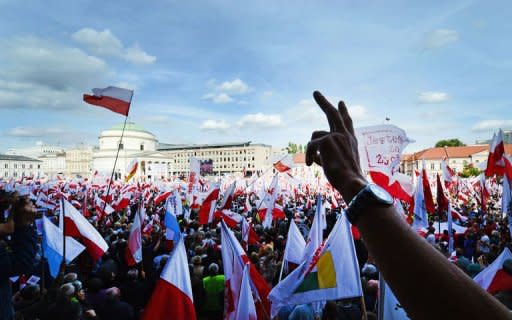Polish opposition draws thousands for anti-government rally
Tens of thousands of opponents of Poland's centrist government massed in the capital Saturday for a protest called by trade unions, an ultra-Catholic movement and politicians. Organisers put the turnout at 100,000, while Polish media estimated the number at 40,000, but neither figure was immediately confirmed by police. Mustered by organisations including the Solidarity trade union, the ultra-conservative Catholic media broadcaster-cum-political movement Radio Maryja and the main conservative opposition Law and Justice party, the demonstrators flooded in from across Poland. After a Catholic mass in central Warsaw, they marched three kilometres to the capital's Old Town district singing religious and patriotic songs. Addressing the crowd on the historic Castle Square, Law and Justice leader Jaroslaw Kaczynski said it was time for change. "Today, we need renewal, and above all, moral renewal," he told the crowd, to rapturous applause. "Poles are exploited by those who manipulate the people, and who have no respect for the law. Democracy is becoming fictional," he insisted. The marchers were united in their antipathy to centrist Prime Minister Donald Tusk, though their concerns vary widely. Supporters of Radio Maryja -- part of the media empire of controversial priest Father Tadeusz Rydzyk -- are angry that its television arm Trwam was not one of the channels included in a nationwide digital broadcast package, claiming the decision is political. "We demand the right to freedom. That's why we want Trwam," said Kaczynski, who has long claimed that the mainstream media backs Tusk. Poland's Audiovisual Council opposed Trwam's inclusion in the digital package, citing concerns over its source of financing, and the channel continues to broadcast on satellite and cable. Marchers from Solidarity -- the iconic union which helped bring down Poland's communist regime in the 1980s and now has close ties to Law and Justice -- turned out to oppose to the government's decision to raise the retirement age to 67. Tusk's centrists have been in power since 2007, and the opposition failed to stop him winning a landmark second term in last year's elections. Poland is the only member of the European Union to have remained in growth since the global economic crisis struck in 2008, but many in the nation of 38 million are concerned about a slowdown driven by the persistent economic woes of its EU trade partners. "I've come to protest to show that there are people who are unhappy with what's going on in Poland. The economic situation is getting worse, and our children will have a harder life than we have," Piotr Zaremba from Czarna Bialostocka northeast of Warsaw told AFP. In 2009, Poland's economy expanded by 1.7 percent compared with the previous year, before growth rose to 3.8 percent in 2010 and 4.3 percent in 2011. But growth is forecast to be down to 2.5 percent this year, and 2.2 percent in 2013. In addition, unemployment has remained a persistent problem despite economic stability, standing at 12 percent. Experts blame inadequate retraining programmes to help the jobless change careers, housing problems that make it tough to move to more prosperous regions of the country, and the role of the "grey" economy.




